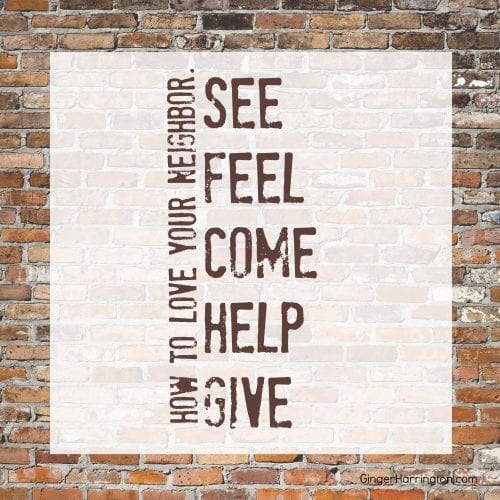The day is cold with a biting bitter wind.
I pull my hat down over my ears and rush to keep up with my family. This is our first visit to New York city, and feeling out of place, I stop to look at the display in a store window. I admire the glitz of sleek, empty-eyed mannequins dressed in the posh style of Saks Fifth Avenue.

Cars honk as a sidewalk musician belts out the familiar tune of Amazing Grace. The sounds of the city fill my ears.

I barely notice the blind man standing on the street corner.
Even with a brief glimpse, there is no mistaking his plight. With a white cane in one bare hand and a red plastic cup in the other, he holds out hope for the kindness of strangers. His unseeing eyes are white, scarred with an unknown story. In the bustle, someone accidentally bumps his outstretched hand and the coins scatter on the pavement.
The blind man cries out with a desperate frustration that pierces my heart. It is the sound of misery. I bend down, back to the passing crowd, and pick up coins as the man’s rough, bare hands grope along the cold concrete. Helping him up, I add a few bills to the cup and say a few awkward words. I don’t even know what I said.
People pass by, one after another. Turning, I walk away, uncomfortable in the knowing that I haven’t done much to help this man. Who is he? Where does he sleep? How does he survive, blind on the frantic streets of New York?
Later, I tell myself I should have given the man my gloves. A small kindness in a cold world. A little love to warm his hands.
But the moment is gone.

But a Samaritan.
“But a Samaritan, who was on a journey, came upon him; and when he saw him, he felt compassion, and came to him and bandaged up his wounds, pouring oil and wine on them; and he put him on his own beast, and brought him to an inn and took care of him” (Luke 10:33-34).
Those listening to the story would bristle with surprise that the Samaritan is the hero to help the beaten man on the side of the road. According to the bias of prejudice, the Samaritan would be the least likely one to help. The least expected one to do the good thing, the right thing. What would this Samaritan know about loving God and loving neighbors?
In this simple story, Jesus flips expectations upside down. The pious are heartless and the sinners respond with kindness. What a gut-wrenching challenge to all of us who claim to love God.
Where am I in this story? Where are you?
I remember how quickly I walked away from the blind man shivering on a cold street corner. Is my tendency to be the religious one who bypasses the needs of my neighbor? On my best days, I want to follow the example of the Samaritan. But do I?

Will we love our neighbor?
The Samaritan loves with actions.
- He sees.
- He feels compassion.
- He comes—he is present and involved.
- He helps—he bandages the wounds.
- He gives—he provides care for the man and generously pays the bill for his needs.
See, feel, come, help, and give—these are the actions of loving our neighbor. In the complexity of this world filled with the hurting and the broken, it is a hard call to love strangers as neighbors. Suspicion jades our good inclinations and busyness clouds our judgement.
[tweetthis hidden_hashtags=”#goodsamaritan”]Mercy and compassion that moves us to action. This is love for our neighbor.[/tweetthis]
[tweetthis]We cannot meet every need, but we can reach out to one person.[/tweetthis] We can see them. Why is it so hard to really see the needs of others with care and concern? Tempted to pass by, preoccupied with too many doings, why is it so hard to see the one God wants us to love?
……………………………………………………………………………………………………………………..
Join me for the other posts in a brief series:
How to Love God with Your Life
Sharing with my bloggy neighbors at Inspire Me Monday, Testimony Tuesday, #RaRaLinkup, Coffee for Your Heart, #TellHisStory, and #ThreeWordWednesday.

 So glad you're here. I help busy women—gals like you— build healthy habits for living well with biblical wisdom and practical steps to deepen your faith, increase your hope, and thrive in your purpose.
So glad you're here. I help busy women—gals like you— build healthy habits for living well with biblical wisdom and practical steps to deepen your faith, increase your hope, and thrive in your purpose.




It’s difficult to know what the right thing to do is. I’m glad you helped him gather his coins and added to what he had. I’m sure he appreciated it.
Yes it can be challenging to know the right thing to do. We all experience situations like this at times. Thanks for visiting today and have a great week.
What a moving story, Ginger. I too struggle with how best to help people who obviously need help. I feel so powerless, so inept. And those are just the ones I see. How many have I overlooked because of my own self-absorption?
Oh me too. Me too. And often times there is little we can do to make a long term difference, but remembering to pray along with whatever help we give opens the doors to God’s hand. Thanks for visiting today. I’m so glad we have crossed paths in the bloggy world.
One person…today, I want to focus on the one because today the masses almost overwhelm me. Thanks for visiting me, Ginger, and leaving encouraging words. xo#TWW
I love the way you put it in a nutshell with “one person…today.” May God bless your efforts to be a blessing to others.
We miss so much, don’t we? So many people that are just longing to be seen. I’ve been praying that God reminds me to slow down, to look around, and to reach out when needed. Thank you for reminding me of that again today, Ginger. #coffeeforyourheart
Thanks for joining in the conversation today, Tiffany. I can be very absentminded and caught up in my head, so I don’t see what is really around me at times. When I was reflecting on this story, it really hit me the difference between the way the religious leaders and the good Samaritan in the way they see.
Oh, I feel you here, Ginger. There have been so many times I’ve missed an opportunity like that. I’m often too slow with my “yes”s. Thankful for grace to get second chances tho!
“Too slow with my yes,” is it exactly. But I learn from those experiences and am hopefully more responsive the next time. Thanks for visiting. Loved your post today on a similar topic.
Oh to see, feel and love more like Him!
For it’s “Mercy and compassion that moves us to action.” Wonderful, blessed post!
Jessica, how lovely to meet you in this online space of fellowship! Thanks for visiting today and I’m so glad you have been inspired through your visit.
Yes – I’m sitting here thinking about how to love my neighbor I first have to SEE MY NEIGHBOR. Those three words are speaking to me. Thanks for linking up at #ThreeWordWednesday.
Yes, we completely miss the opportunity to show love when we don’t recognize the opportunity. Once we notice, then we have to choose to show love. I’m so glad that there is such a variety of ways we can love one another.
This is so true, but hard to do! It helps me if I don’t watch the news or look at the tv websites. I used to have WRAL as my home page. Had to stop. I saw too many bad tignhs. This way I don’t know about it! LOL
Yes it is often a challenge! I try to be careful about what I take in as well. Thanks for joining the conversation, Carla!